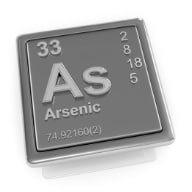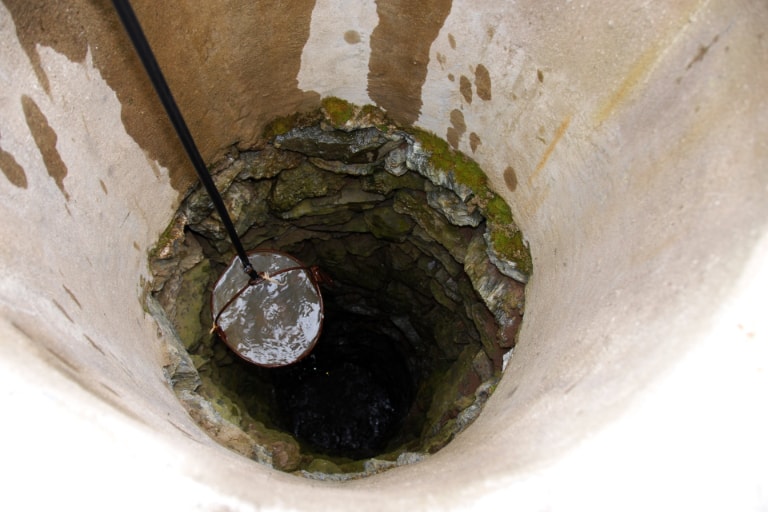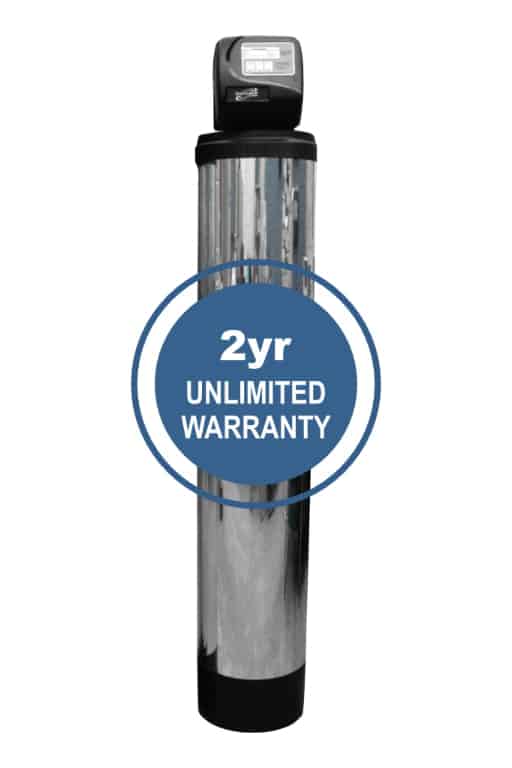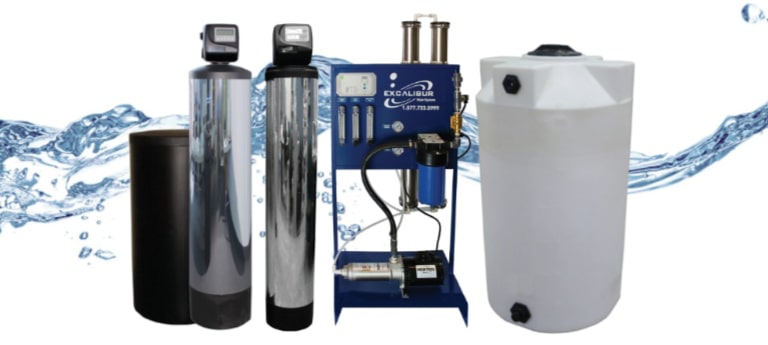Did you know there is a tasteless and odorless poison that could be lurking in the tap water that you drink each day? Arsenic certainly does not come to mind when you reach for a refreshing drink of tap water, but this poisonous mineral most definitely can be found in drinking water. It has a reputation for being known as the “king of poisons” and the “poison of kings” with a sinister long, and deadly history. It may surprise you that there are traces of arsenic in all living matter. Although arsenic can be found in some foods, soil, and air, most people are exposed by drinking tainted water. Arsenic is a grave concern in groundwater and wells supplying drinking water.
What is Arsenic?

Arsenic is a semi-metallic element within inorganic and organic compounds and is represented as “As” on the periodic table. When found in water, it does not dissolve easily, and in some geographic regions, high levels accumulate from surrounding rock and soil. Although arsenic occurs in nature, it is well established as a poisonous substance; it produces harmful health effects, is classified as a known carcinogen, and ingesting extreme amounts can be fatal. So how and why would it ever be present in drinking water? And how do you remove it from your drinking water?
Where Is Arsenic Used or Found?
For approximately 100 years, arsenic has been used industrially and commercially as an alloying agent for making lasers, transistors, glass, textiles, paper, ammunition, pharmaceuticals, feed additives, and pesticides. Interestingly history tells that Hippocrates and Aristotle used arsenic to treat specific ailments, and until the use of antibiotics, it was used to treat syphilis, malaria, asthma, and more. However, arsenic has a dark history as both an intentional and unintentionally deadly poison. Many suggested and suspicious deaths throughout history have occurred from undetectable arsenic poisonings. It is well documented that the aristocratic Borgia and Medici families used arsenic to remove any ruling rivals, and it is suggested that Napoleon Bonaparte died of arsenic poisoning in 1851.
Arsenic particles are created from burning fossil fuels, waste burning, metal products such as gold mining, pressure-treated wood products, and agricultural uses, including feed and pesticides. Naturally occurring arsenic from dissolved mineral deposits and rock formations enters lakes, rivers, and underground water sources. It also enters water via arsenic dust particles dissolved in rain or snow. Arsenic particles are created from burning fossil fuels, waste burning, metal products such as gold mining, pressure-treated wood products, and agricultural uses, including feed and pesticides. High levels of arsenic are most often found in wells drilled in the bedrock where the arsenic occurs naturally as opposed to surface groundwater or dug wells.

Only certain areas are prone to high arsenic levels, so the best and only way to be sure is to have your tap or drinking water professionally tested by an accredited laboratory. Many municipalities known to have high arsenic levels have programs set up to provide well and groundwater testing and information. Still, private testing with a qualified professional water treatment specialist is highly recommended to obtain the safest drinking water.
Dangerous Health Effects of Arsenic
Many studies show that exposure to arsenic-contaminated drinking water produces harmful health effects, and the longer the toxic exposure, the more serious the health issues. Exposure to arsenic in drinking water is absorbed by the body and distributed to the bloodstream, with some of the highest concentrations found accumulated in hair and nails. Arsenic does not absorb into the body by inhalation or through the skin, such as with showering and bathing.
Food can also be a source of exposure with rice, and products made with rice can accumulate very high arsenic levels. Smokers are at higher risk for harmful health effects due to the fact that cigarettes contain arsenic, increasing their exposure. However, tainted drinking water remains the primary source of toxic arsenic exposure leading to adverse health issues, including cancer.
Studies show that drinking water with naturally high levels of arsenic over many years increases the risk of developing cancer in the internal organs of the liver, lungs, and skin. Further studies show it may cause bladder, kidney, and prostate cancer. A large study performed in Taiwan, where very high levels of arsenic are naturally present in the drinking water, clearly showed that long-term exposure increased the risk of developing cancer in the bladder, lungs, and liver.
Studies show that acute high-dose exposure via drinking water causes several health issues, including,
- Memory issues and loss of movement
- Burning, tingling, or numbness sensation and pain in the hands and feet
- Muscle pain or cramping
- Vomiting, diarrhea, and abdominal pain
- Skin rash and weakness
- Thickening of the sin on the soles of the feet and the palms of the hands.
With Long term repeated exposure, drinking water with medium to high levels of arsenic produces:
- Skin lesions
- Diabetes
- Decreased production of red blood cells
- Blood vessel damage and abnormal heart rhythm
- Nausea and vomiting
- Neurological effects
- Numbness of the hands and feet
- Discoloration and thickening of the skin.
Is There Arsenic in My Drinking Water?

The best amount of arsenic in drinking water would be none, but unfortunately, it occurs naturally in some water, and for specific areas, its natural levels can be very high. National organizations provide drinking water quality recommendations and limits for arsenic in drinking water. Health Canada’s Guidelines for Canadian Drinking Water Quality and the EPA (Environmental Protection Agency) list the acceptable MAC or maximum acceptable concentration for arsenic as 0.010 mg/L (milligrams per liter), and the Who (World Health Organization) sets its drinking water guideline at 10 ug/L (10 micrograms per liter). Since arsenic is listed as a poison and carcinogen, removing as much arsenic as possible is vital to your family’s health. So whether you are drawing drinking water from a city or private well, testing your water is critical.
Municipalities have established guidelines for testing and maintenance of their wells. However, most private well owners are responsible for testing their well water for any drinking water concerns, including dangerous arsenic levels. There are government and health department recommendations for private well owners, such as suggesting well owners test wells at least twice per year with only accredited laboratories and suggesting water treatment systems for removing arsenic. For the most current and state-of-the-art water treatment systems that remove arsenic and a host of other harmful bacteria and contaminants, consult a professional water treatment specialist. They are knowledgeable specialists that can test your water and suggest the perfect system to meet your specific water concerns, including arsenic removal.
How To Remove Arsenic From Your Drinking Water
If you have tested your well water and it contains arsenic at levels higher than the set guidelines, it is imperative to consult a professional water treatment specialist. Do not try to remove the arsenic on your own; only specialized water treatment systems can ensure the safe removal of arsenic from your drinking water. Do not boil arsenic-contaminated well water, and do not use a simple carbon water filter, such as a countertop pitcher; neither is effective at removing arsenic. However, adding a water filtration system that removes arsenic will provide you with the safest and purest drinking water available.
It is essential to determine the chemistry of your well water, the type of arsenic, and any other harmful contaminants present. Knowing these facts helps determine the best water treatment system for your specific needs. Two common forms of arsenic are found in your well water supply, arsenic 3 and arsenic 5. If your water is contaminated with arsenic 3, it is harder to treat and more toxic. An oxidative pretreatment is necessary to remove all water hardness, iron, manganese, and hydrogen sulfide before the arsenic filter that converts arsenic 3 into arsenic 5, making it easier to treat and treat and remove. A water treatment professional can help safely determine these issues.

An Arsenic Filter System is a specialized, highly effective water treatment filtration system designed to remove up to 99% of the toxic arsenic in your well water. The specialized filter contains media that holds and removes the arsenic, ensuring none returns to your well water. It is a chemical-free energy efficient system that uses only minimal power consumption. This system provides the most potent arsenic removal for private well owners with large amounts of arsenic.
A Reverse Osmosis Water Filtration System provides residents using the lake and private well water another filtration option that can also remove toxic arsenic from your water. Water is pushed through the system through filters and a semipermeable membrane, filtering and eliminating poisonous chemicals such as arsenic and a host of other harmful substances, bacteria, pollutants, and contaminants. A reverse osmosis system is good at taking out low to moderate amounts of arsenic and several other toxic chemicals. A reverse osmosis system will usually work well for private well owners with low to moderate arsenic levels concerned with purifying their household drinking water.
For private well owners with very high levels of naturally occurring arsenic, a reverse osmosis system may be unable to remove high arsenic levels on its own. It may require other filters to make drinking water pure and safe. A professional water treatment specialist may also recommend the need for tannin, turbidity, lead, iron, ph neutralizing, and uranium filters and design a custom system to meet your well water needs. The water treatment specialists will ensure the water filtration system you choose has high-quality water treatment products tested, approved, and certified by NSF International (National Sanitation Foundation) ANSI American National Safety Institute. These certifications help ensure the product’s performance, the safety of the materials, and proper system usage.
For cottage, lake property, and well owners, water conditions can vary greatly, so making your water supply potable is vital. Still, you may want or need to take it one step further by making your household water as clean as possible. A Whole Home Water Filtration System provides purified water throughout the house, not only from the drinking taps but also for cooking, bathing, laundry, and cleaning. It is a more extensive system requiring a large installation area and costs more than a reverse osmosis or arsenic filtration system. However, it is critical for those with highly contaminated lake or well water.

These days it is vital to know what is in your drinking water; with increased pollution and contamination, your municipal or private well water may contain poisonous contaminants like arsenic. Installing a proper arsenic removal system eliminates any arsenic found in your water. Over time, arsenic can cause serious health issues, even in small amounts. Your drinking water should be clean, fresh, pure, and safe. Contact a water treatment specialist and have your water tested for arsenic to ensure your drinking is as healthy as possible.
For more information about Excalibur Arsenic Removal Filters, Reverse Osmosis Systems, or Whole Home Filtration Systems, please contact us.


